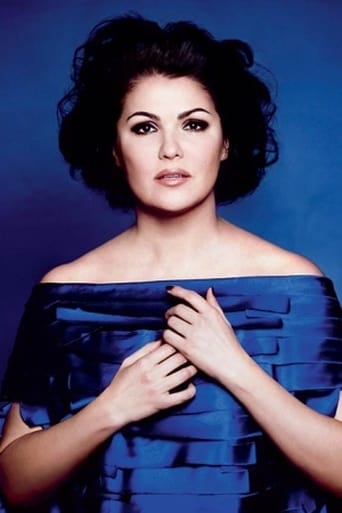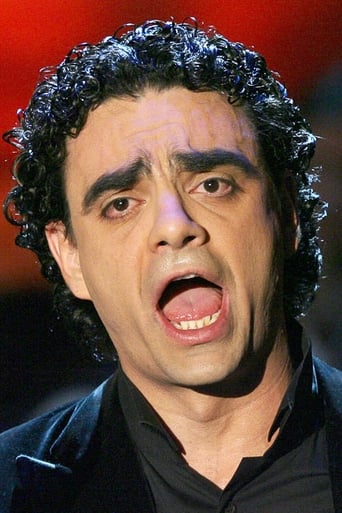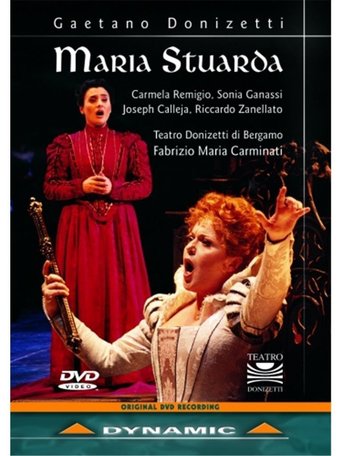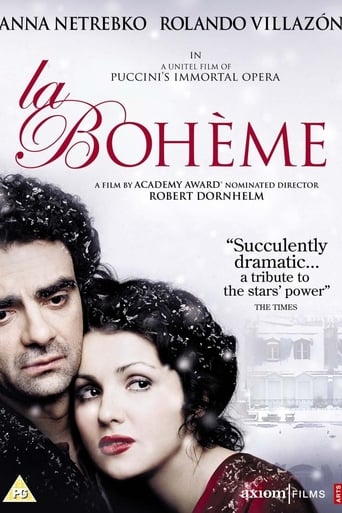
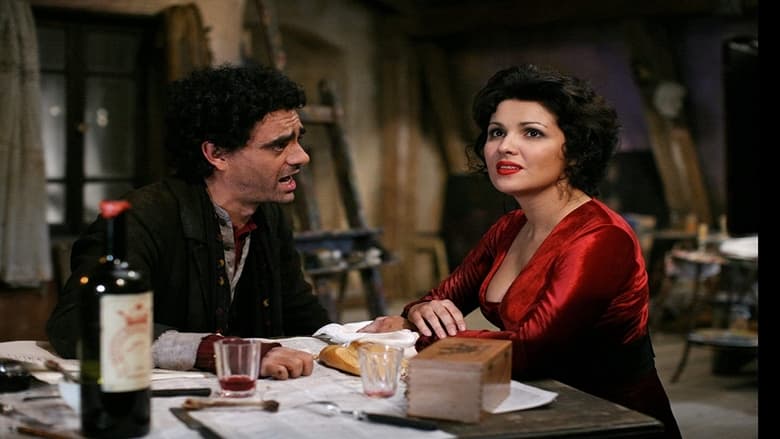
La Bohème (2009)
Giacomo Puccini's immortal opera, in a high budget feature-film version directed by Academy Award nominee Robert Dornhelm, stars opera's 'Golden Couple', Rolando Villazon and Anna Netrebko as the protagonists, Rodolfo and Mimi. The chemistry between them is electric, unrivalled in the theatre today. Russian soprano Anna Netrebko is not only beautiful but has a marvelous voice and technique; Mexican tenor Rolando Villazon, has a wonderful voice and an incredible charisma. The director not only wanted to remain steadfastly faithful to Puccini's design but also document two of the leading singers of the modern age rather than embarking on a 'trendy' contemporary re-creation.
Watch Trailer
Cast
Similar titles
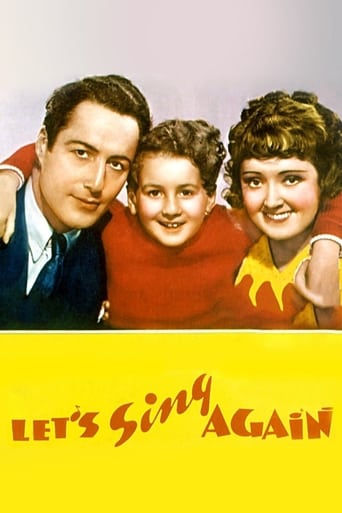
Reviews
Very best movie i ever watch
Lack of good storyline.
Like the great film, it's made with a great deal of visible affection both in front of and behind the camera.
It is a whirlwind of delight --- attractive actors, stunning couture, spectacular sets and outrageous parties.
I discovered this production on You Tube while surfing. What a great find! I am an opera buff and Boheme is my number one favourite. (There is a disk of the last scene in ACT 1 filed with my will with instructions it be played at my funeral.) I have seen Boheme live and on video many times. I have countless productions on VHS, DVD, casettes and CD's. But I never have seen Netrebko in it. She is a SUPERB Mimi --- devious, flirty and coy. (A little too healthy looking for somebody dying of "consumption" but what the heck... this is opera...) Nicole Cabelle is a wonderfully unique Musetta. And they have captured the boisterous camaraderie of the students perfectly as well as the atmosphere of Paris in the early nineteenth century. I've always loved the Zeffirelli film of La Traviata. This is its equal!
It is surprising to see the number of naysayers among the reviews of this filmed version of Puccini's beloved LA BOHEME singling out the very elements that allow stage works to become transferred to the film medium (lip syncing, closeups of cinematic details, uses of both black and white and color, etc). What seems to be overlooked is this chance to see the two leading interpreters of this opera in wide distribution for those who cannot see them in person. As a film this version by Robert Dornhelm works wonders with the intentions of Puccini's bohemian lovers living on little but their love of the arts and for life in the Parisian garrets in the snowy wintertime. He introduces moments of Paris in the snow in black and white, much like old animated daguerreotypes, before the brief overture begins and keeps the flavor of the action moving seamlessly while adding additional elements of information using the same format. He offers some visual information about the passion of the lovers that allows him to reference these moments later in the story when memory brings them forward. All of this makes the opera more than opera: these elements make this a fine movie. But the true pleasure of this film is the glorious singing and acting of Rolando Villazón and Anna Netrebko as the lovers. They are gorgeous to look at, magnificent in their vocal interpretations, and extraordinary actors. And close behind them is the camaraderie of the entire cast, especially Nicole Cabell as Musetta, George Von Bergen as Marcello, Adrian Eröd as an exceptional Schaunard, and Vitalij Kowaljow as Colline. The involvement in the story is solid and wholly believable and this is a cast of 'minor characters' whose presence is constantly felt and appreciated. Bertrand de Billy conducts with a sure hand. In short if anyone can watch this version of LA BOHEME with a dry eye, then perhaps they are not giving the power of Puccini a chance to be extended into the cinematic techniques required of really excellent film-making. Grady Harp
I was excited to watch this film on PBS after an early holiday dinner. It certainly didn't get off to a good start, with the young Bohemian roommates overacting and over-singing, about nothing at all. Apparently, director Robert Dornhelm had no idea how to play that down. Or else he didn't bother; I don't know. Rolando Villazón should have been encouraged to start off in a more subtle way, with less volume and less mugging. And the makeup artists surely could have done something to make him appear less lugubrious.It was disappointing to see Anna Netrebko, a riveting actress and singer, so ill-used. Again, there must have been some way to make her appear both more attractive and more interesting; on stage, she is gorgeous and completely unique. The split-screen technique made no sense and added nothing to the drama, while scenes that featured people singing off-screen were confusing and boring.I'm sure this is not entirely the director's fault. Grand opera fares best on the stage, and often appears stiff and overblown in film versions. Probably the best idea would simply have been to film the singers performing on stage in front of an audience. We would have gotten the benefit of verisimilitude, and the dramatic gestures and heroic singing that opera demands would have seemed much more fitting.Oh, well!
It is what it is: a film version of an opera - they can never be anything else after all. This must be seen as a film of people miming to music with cinematography augmented by digital cartoonery supplanting stage drama, and judged on those merits. As a film it's pretty - pretty enjoyable and pretty well worth watching and of course Anna Netrebko as Mimi is fairly pretty too!Young penniless couple meet, fall instantly head over heels in love for no reason at all but their dreams are cruelly cut down by her illness and all to some of the most emotionally charged music ever written. So long as the music, libretto and script are adhered to a film version can't go wrong - the director generally sticks to it and doesn't force his own interpretations on us too much. When he does, it works: a restrained use of artistic license. And there's nice imagery, plush backgrounds and clever use of colour. Trouble is, the atmosphere generated by a live performance is lost with a film – the lavish 2008 Met Opera production by Zefferelli recorded with Angela Georghiu and Ramon Vargas had its faults too but imho is preferable to this. We all probably have our own favourite versions of Puccini's most famous opera – mine is the May 1938 complete recording in Milan with Beniamino Gigli as Rodolfo (especially of O Mimi, Tu Piu Non Torni at the beginning of Act 4 - something so beautiful which has not been bettered since the advent of stereo or digital - since the singer was unrepeatable). What's yours? For arguments sake I could also say the legendary Lucrezia Bori's Mimi still resonates well through the acoustic mono hiss from her century-old records.Netrebko has a fine and well controlled voice, but having seen her repeatedly wallow in a swimsuit to Dvorak's Song To The Moon on the late UK Classic FM TV I still wonder whether she's punching above her weight with operas like La Boheme – incidentally great blood spattered acting in the Met's Lucia Di Lammermoor a few months ago but is she colouratura enough? Her acting for the camera here is also fine, something which is occasionally in doubt when she's performing live – however the rapturous applause from her adoring Met audiences for her various performances this year leave no doubt of her superstardom. Favourite bits from many: O Soave Fancuilla - definitely not bathed in moonlight; Dunque: E Propio Finita in the pouring snow; naturally the climax back in the garret – as suitably tearjerking as it should be. However, this is a film (with minor faults) well worth the time/effort and an admirable vehicle for Anna Netrebko, as it should be. Brava!
